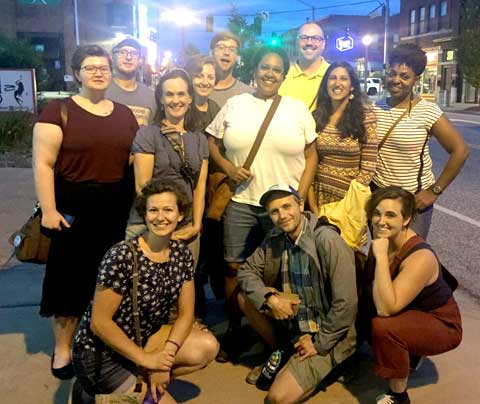Kentuckians explore a new economy at CommonBound
From June 22 to June 24, at least 17 Kentuckians converged at Harris-Stowe University in St. Louis, Missouri to attend CommonBound 2018.
Hosted by the New Economy Coalition and locally based organizations – in this case Solidarity Economy St. Louis – CommonBound is biannual conference that draws hundreds of organizers, leaders and revolutionaries from across the country to answer the question: How do we build a new, just and non-extractive economy?
KFTC members Amanda Fuller, Cassia Herron, Heather Hyden and Collin Alexander attended CommonBound on behalf of KFTC, along with KFTC staff members Jacob Mack-Boll, Alicia Hurle, Becky Jones, Tyler Offerman and Nikita Perumal.
 They were also joined by several active KFTC members who attended the conference on behalf of other organizations – including Louisville Metro’s Center for Health Equity, the Mountain Association for Community Economic Development and the Kentucky Student Environmental Coalition.
They were also joined by several active KFTC members who attended the conference on behalf of other organizations – including Louisville Metro’s Center for Health Equity, the Mountain Association for Community Economic Development and the Kentucky Student Environmental Coalition.
Collin Alexander, a Rowan County chapter member and manager of the Community Recycling Center in Morehead, was taken by “the sense of community that was immediately established by hundreds of people from around the globe who had never even met each other.”
“We all connected in a passion for and strive towards a sustainable, promising future for all people,” Alexander reflected. “Although I was far from an expert panelist on any of the subjects talked about, I felt as though my insight from east Kentucky was valued.”
CommonBound organizers were careful to structure the conference in a way that made room for a diversity of topics, experiences and learning styles. The first day of the conference was comprised of “network gatherings” – half- or full-day gatherings that served as deep-dives into a variety of topics.
KFTC member Chris Woolery, alongside Organizing Apprentice Nikita Perumal, helped coordinate one of these gatherings, which was focused solely on organizing in rural electric cooperatives.
The rest of the conference was split into carefully curated plenaries, brief “rad talks,” film screenings and concerts, local site visits and more than 50 workshops that corresponded with 10 thematic tracks.
Folks from the Kentucky delegation attended an impressively diverse set of workshops, such as “Just Transition to a Feminist Economy,” “Healing Justice and Collective Care in Our Movements,” “Participatory Budgeting for Inclusion and Equity,” and “Energy Democracy: Advancing Equity in Clean Energy Solutions.”
Attendees learned about everything from how community investment funds can be structured to redistribute wealth and start community-led businesses; to efforts nationwide to establish worker-owned cooperatives; how to avoid burnout in our movement spaces to the value of affordable housing through community land trusts.
Jefferson County chapter members Fuller and Herron are working to start a food cooperative in Louisville. In reflecting on what she took away from CommonBound, Fuller observed: “What [a new economy] looks like to me is people helping each other solve problems and provide goods and services.
“A new economy has human and environmental well-being as its goal, not the accumulation of capital (which relies on the exploitation of humans and the environment),” Fuller added. “I’m involved in starting up a cooperatively owned grocery store in Louisville, so I was paying particular attention to conference sessions about raising money and organizing cooperatives.”
Herron shared, “CommonBound helped to affirm our vision and work to open the grocery store. Being there was a confidence booster and gave us new ideas about creative financing approaches to the work.”
Central Kentucky chapter member Heather Hyden appreciated the variety in sessions, as well as the conference being family-friendly.
“We appreciated being able to bring a very tiny baby to the gathering and not miss out on connecting with communities of people across the country working to develop new economies,” she noted. “I've already told several people about the Burn Out workshop we attended. Also, I plan to connect with other leaders in Louisville and the Our City Our Voice organization about how to implement a participatory budgeting process in Lexington.”
To learn more about the New Economy Coalition, visit neweconomy.net. Livestreams of certain workshops, and the Friday and Saturday plenaries, are at https://commonbound.org/2018/livestream.
In the words of Amanda Fuller, “[t]he New Economy is ours if we want it!”
Recent News
Kentucky’s past legislative session showed alarming trend toward government secrecy
Churchill Downs takes more than it gives. That's why the Kentucky Derby is a no-go for me
‘We must never forget.’ Kentucky town installs markers for lynching victims.
Featured Posts
Protecting the Earth
TJC Rolling Out The Vote Tour – a KFTC Reflection Essay
KFTC Voter Empowerment Contractor Reflection Essay
Archives
- Home
- |
- Sitemap
- |
- Get Involved
- |
- Privacy Policy
- |
- Press
- |
- About
- |
- Bill Tracker
- |
- Contact
- |
- Links
- |
- RSS

